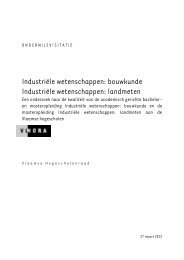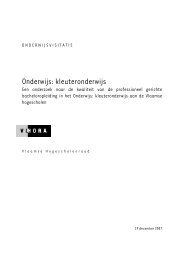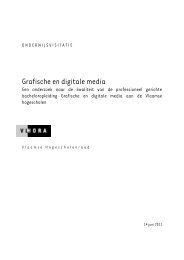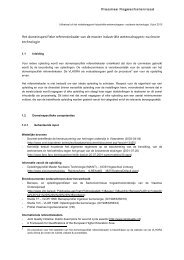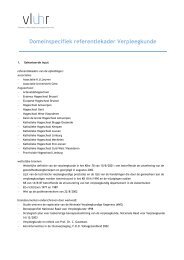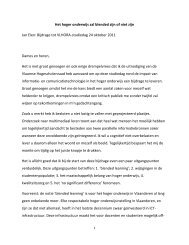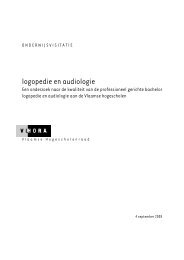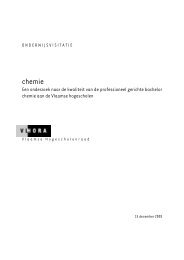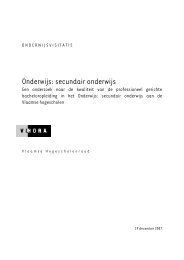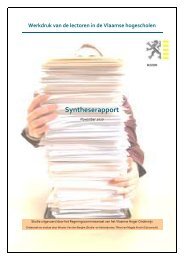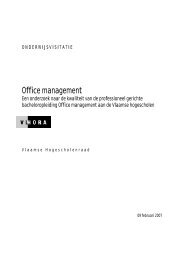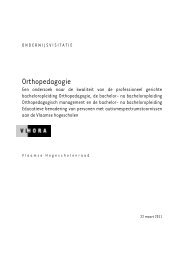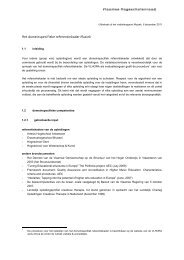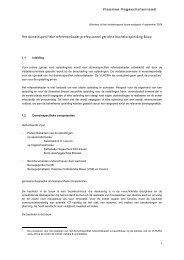Towards a Diversified, Responsive and Competitive European Higher
Towards a Diversified, Responsive and Competitive European Higher
Towards a Diversified, Responsive and Competitive European Higher
Create successful ePaper yourself
Turn your PDF publications into a flip-book with our unique Google optimized e-Paper software.
Copyright © 2012 by EURASHEAll rights reserved. The contents of this publication may be reproduced in part, except for commercial purposes,provided that the extract is preceded by a complete reference to EURASHE (<strong>European</strong> Association ofInstitutions in <strong>Higher</strong> Education), followed by the date <strong>and</strong> title of the publication of the document.
INTRODUCTIONBeing the voice of professional higher education <strong>and</strong> a consultative member of the BolognaFollow-up Group, EURASHE is very pleased to communicate this positioning paper <strong>and</strong> policypriorities: “<strong>Towards</strong> a <strong>Diversified</strong>, <strong>Responsive</strong> <strong>and</strong> <strong>Competitive</strong> <strong>European</strong> <strong>Higher</strong> Education”to the Ministers of EHEA, on the occasion of the Ministerial Conference <strong>and</strong> Bologna PolicyForum, Bucharest, 26-27 April 2012.EURASHE is the <strong>European</strong> Association of Institutions in <strong>Higher</strong> Education who offer professionally-orientedprogrammes <strong>and</strong> are engaged in applied <strong>and</strong> profession-related research within the Bologna cycles. Weprofess a broad interpretation of ‘teaching <strong>and</strong> learning’, including non-formal <strong>and</strong> informal contexts, whichis based on applied sciences, arts <strong>and</strong> technologies, <strong>and</strong> prepares prospective graduates for a smoothtransition from training <strong>and</strong> learning into the working life.EURASHE holds the view that all institutions of higher education have a three-fold mission, i.e. teaching,research <strong>and</strong> services to the community. Their scope <strong>and</strong> focus depend on the specific profile <strong>and</strong> mission of theinstitution, <strong>and</strong> may have varying stresses <strong>and</strong> outputs. Professionally-oriented institutions <strong>and</strong> programmeswith their close links to stakeholders emphasise a key role of learning, share a broad interpretation ofinnovation <strong>and</strong> research, aiming at practical applications <strong>and</strong> outcomes.As a stakeholders’ organisation, influential in 47 countries inside <strong>and</strong> outside the <strong>European</strong> <strong>Higher</strong> EducationArea, EURASHE is engaged in diverse fields, which include: quality assurance, qualifications frameworks,lifelong learning, employability, applied research <strong>and</strong> the social dimension of higher education. Within thesehigher-education activities, we cooperate with public <strong>and</strong> private sectors at national <strong>and</strong> <strong>European</strong> levels.Through our vast <strong>and</strong> diversified membership, which operates at both programme <strong>and</strong> institutional levels,we also promote the link between higher <strong>and</strong> vocational education. Moreover, we are well positioned inthe major social-dimension themes, which include lifelong learning, employability <strong>and</strong> student-centredlearning.EURASHE acknowledges that National Qualifications Frameworks effectively enable <strong>and</strong> enhanceopportunities for access, transfer <strong>and</strong> progression between cycles <strong>and</strong> within different <strong>European</strong> systems,provided, of course, transparent <strong>and</strong> approved external <strong>and</strong> internal quality assurance systems are inoperation.In a local <strong>and</strong> regional context, together with our segment of Universities of Applied Sciences (also groupedin the UASnet partnership), EURASHE actively <strong>and</strong> strongly supports innovation <strong>and</strong> research, in line withwhat was stated in the Leuven Communiqué (2009):<strong>Higher</strong> education should be based at all levels on state of the art research <strong>and</strong> development thus fosteringinnovation <strong>and</strong> creativity in society.2
II. RESPONSE FROM PROFESSIONAL HIGHER EDUCATION TO IDENFIEDCHALLENGES FOR SOCIETY & HIGHER EDUCATIONFor this forthcoming Ministerial gathering, we are reformulating our intentions <strong>and</strong> reaffirming ourcommitments on behalf of the diverse institutions of professional higher education we represent. We aredoing so, fully aware of the challenges the institutions <strong>and</strong> sectors/programmes are facing in a period ofeconomic <strong>and</strong> financial downturn. At the same time we are maintaining our firm belief in a process of reformof higher education which has already shown its effect, <strong>and</strong> has made steady transparent progress, thoughnot everywhere at the same pace <strong>and</strong> neither in all fields of undergraduate <strong>and</strong> postgraduate education <strong>and</strong>training. We believe that robust <strong>and</strong> systemic investment in (higher) education <strong>and</strong> learning is a key responsenot only to the current crisis, but to long-term challenges which our societies face.We are looking again at the domains we identified back then in 2010, <strong>and</strong> at the expectations we were thenexpressing for each of them, <strong>and</strong> how we were hoping to contribute to their further achievement. This paperalso focuses on a next stage, namely the realisation of the operational objectives, <strong>and</strong> what this requires fromdecision makers by the next Ministerial meeting of the EHEA, which is scheduled to take place in Yerevan in2015.A. National Qualifications Frameworks <strong>and</strong> Student Centred LearningEURASHE believes that National Qualifications Frameworks lie at the heart of efforts to transform highereducation in Europe. They offer a means to increase significantly the opportunities for access, transfer <strong>and</strong>progression within <strong>and</strong> between different <strong>European</strong> educational jurisdictions, whilst promoting employability<strong>and</strong> lifelong learning by offering multiple entry <strong>and</strong> access points. Qualifications Frameworks also make<strong>European</strong> higher education more accessible <strong>and</strong> comprehensible for students from outside Europe withoutcompromising the diversity of <strong>European</strong> higher-education provision. Professional higher education is adistinctive part of this diversity <strong>and</strong> regularisation, <strong>and</strong> EURASHE encourages its members in their efforts toparticipate in global exchanges in higher education <strong>and</strong> promote the attractiveness of the EHEA.Within National Qualifications Frameworks, the establishment of learning outcomes as a central componentplaces learners, rather than systems or institutions, at the heart of higher education. Focusing on learningoutcomes at institutional level ensures appropriate attention to design, delivery <strong>and</strong> assessment of learning<strong>and</strong> encourages a student-centred learning mind-set <strong>and</strong> culture across higher-education institutions.In relation to Qualifications Frameworks, learning outcomes <strong>and</strong> the student-centred learning approach,EURASHE holds that:• focusing on learning outcomes is crucial for linking programmes to Qualifications Frameworks <strong>and</strong>the profiling of institutions;• based on specifics of study programmes, learning outcomes enable institutions to choose a holisticapproach <strong>and</strong> bring an external world focus to the programmes, making learning social, active,contextual, engaging <strong>and</strong> student-owned;5
• proper implementation of Qualifications Frameworks ensures full involvement of students inprogramme design, institutional governance <strong>and</strong> quality assurance. Learning outcomes should bea distinctive feature in the dimension of employability, facilitating students to become responsible<strong>and</strong> active lifelong learners with developed motivation, social skills, capability <strong>and</strong> capacity for selfevaluation,time management skills <strong>and</strong> skills to access information. Qualifications Frameworks areinstruments of transparency, for the defining <strong>and</strong> redefining of curricula, (applied) research <strong>and</strong>institutional management in line with their missions <strong>and</strong> profiles;• qualifications frameworks make it easier to improve national <strong>and</strong> international higher educationalquality <strong>and</strong> quality assurance, <strong>and</strong> also mobility in particular.We therefore urge Ministers to:• promote general wider underst<strong>and</strong>ing <strong>and</strong> awareness of the <strong>European</strong> Qualifications Framework,National Qualifications Frameworks <strong>and</strong> learning outcomes for access, transfer <strong>and</strong> progression inhigher education on national <strong>and</strong> EU level <strong>and</strong> for employability <strong>and</strong> lifelong learning;• ensure that the professional higher-education qualifications are granted full recognition by memberstates <strong>and</strong> all higher-education institutions in the EHEA, in accordance with the QF-EHEA <strong>and</strong>commitments under the Lisbon Recognition;• incorporate innovative labour-market oriented short-cycle higher-education programmes intoNational Qualifications Frameworks <strong>and</strong> ensure appropriate recognition <strong>and</strong> access to further cyclesof higher education for the holders of these qualifications;• highlight the qualifications profile <strong>and</strong> distinctive pedagogic approaches of professional highereducation as features in the global attractiveness of the <strong>European</strong> <strong>Higher</strong> Education Area;• provide <strong>and</strong> support personal development of higher-education institution management <strong>and</strong> staff,exchange of good practice <strong>and</strong> collaboration related to learning outcomes <strong>and</strong> the on-going reflectiveprocess of a student-centred learning approach.We confirm our previous commitment to:• promote the key role of Qualifications Frameworks, learning outcomes across the sector we represent;• strengthen our dialogue with employers <strong>and</strong> the world of work using the Qualifications Frameworks<strong>and</strong> the language of learning outcomes in order to better underst<strong>and</strong> <strong>and</strong> translate their needs <strong>and</strong>expectations towards higher-education outcomes both at systemic <strong>and</strong> institutional level;• provide a platform for sharing best practices <strong>and</strong> seeking inspiration as regards to the potential ofsector- <strong>and</strong>/or profession-specific objectives, methods <strong>and</strong> assessment in higher-education learningwhich would place the students <strong>and</strong> learners into the very centre of the process;• support higher-education institutions who invest in a student-centred learning approach, especiallythose who commit themselves to the link between learning outcomes <strong>and</strong> employability.6
B. Employability <strong>and</strong> Lifelong LearningEURASHE believes that the best long-term future for the citizens of Europe is one in which employability,rather than immediate employment, is fully focused, <strong>and</strong> that it is inextricably linked to the constant pursuitof self-development <strong>and</strong> professional fulfilment through lifelong learning. EURASHE ascertains that thehigher-education institutions it represents are committed to ensuring that graduates of their institutions areprepared as fully for the world of work as possible. It is further our opinion, that the inculcation of a cultureof lifelong learning in graduates <strong>and</strong> the provision of lifelong learning opportunities are key elements of themission for graduates of the institutions that EURASHE represents.The envisaged enhancement of participation in higher education as well as responding to changingenvironment <strong>and</strong> requirements through lifelong learning concept is likely to bring to higher educationnew target groups of learners. In order to respect their experience, ambitions, expectations <strong>and</strong> learningconditions, new approaches leading to effective <strong>and</strong> efficient learning, e.g. recognition of prior learning, maybe adopted widely, without threatening the quality of achieved qualifications.We urge Ministers to:• promote flexible <strong>and</strong> interconnected system of higher education embedded within the lifelonglearning with flexible entry <strong>and</strong> exit points, with effective <strong>and</strong> flexible routes that allow learners toprogress seamlessly through all levels of national frameworks <strong>and</strong> thus ensure that higher educationis accessible to non-traditional learners;• raise <strong>and</strong> promote the culture of lifelong learning as a response to societal, labour market <strong>and</strong>technological challenges <strong>and</strong> as a way of promoting personal developments of individuals;• initiate gathering <strong>and</strong> access to data on employability of higher-education graduates, labour marketprospects in order to empower the underst<strong>and</strong>ing <strong>and</strong> qualified decisions of both higher-educationinstitutions <strong>and</strong> individuals;• make steps for making individuals’ study paths through higher education more effective <strong>and</strong> efficientby acknowledging the role of recognition of prior learning, whilst setting conditions for its transparency<strong>and</strong> correspondence within an overall quality assurance culture <strong>and</strong> its principles <strong>and</strong> st<strong>and</strong>ards.To give effect to these policy objectives EURASHE commits itself to:• promote the flexibility of systems <strong>and</strong> programmes <strong>and</strong> thus ensure that higher education is accessibleto non-traditional learners;• further promote activities <strong>and</strong> tools leading to full integration of the lifelong learning agenda <strong>and</strong> itsactivities into policy, mission, courses <strong>and</strong> services of individual institutions of professional highereducation;• offer a platform for discussion, networks <strong>and</strong> projects to stimulate policy exchange on trainingpolicies to increase employability, as well as to exchange good practices on teaching <strong>and</strong> learningmethodologies in higher education, approaches how to transfer knowledge, skills <strong>and</strong> competencesthat make graduates more employable including elements like placements, practical experience,work-based learning etc.7
• work with national <strong>and</strong> sectorial organisations to promote recognition of prior learning (RPL) as ameans of credentializing the attainment of learning outcomes in non-formal <strong>and</strong> informal learningenvironments;• enhance - for the given purposes of collaboration <strong>and</strong> mutual dialogue with the employers, the worldof work <strong>and</strong> other stakeholders - responses to their needs, expectations <strong>and</strong> informing them ondevelopments, potential <strong>and</strong> capacity of higher-education institutions.C. Quality Assurance <strong>and</strong> Transparency ToolsQuality Assurance has been the domain where the cooperation of the Bologna Process stakeholders hasproven to be most effective. The E4 partners, ENQA, EUA, ESU <strong>and</strong> EURASHE received their m<strong>and</strong>ate firstto draft the <strong>European</strong> St<strong>and</strong>ards <strong>and</strong> Guidelines for Quality Assurance <strong>and</strong> then to set up the Register forQuality Assurance Agencies (EQAR). EURASHE continues, jointly with the ‘E4’ partners to contribute to theproceedings of the BFUG working group on Quality Assurance <strong>and</strong> Transparency Tools, as well as to thefurther development <strong>and</strong> review of the tools for quality assurance.As already formulated in our “10 Commitments”, EURASHE cooperates with international authorities <strong>and</strong>other stakeholders’ organisations to “identify <strong>and</strong> develop such qualitative <strong>and</strong> quantitative descriptors <strong>and</strong>indicators that will ensure the practical usefulness of the multidimensional instruments to the prospectivelearner”.EURASHE further holds the view that:• EQAR-registration reflects a shared trust, but not a choice of a quality assurance model or qualityassurance system. It is part of the mission of EQAR to guarantee a diversity in quality assurance models,but it is the responsibility of policy makers to choose a model that fits their national requirements;• it is a government responsibility to create clarity <strong>and</strong> transparency to stakeholders <strong>and</strong> society aboutthe external quality assurance, ranking <strong>and</strong> classification systems used in higher education. In thisoverall framework, each function or process in the mission of higher-education institutions, such asteaching <strong>and</strong> learning within a wide range of organisational management, research, student services<strong>and</strong> facilities etc., needs an appropriate approach <strong>and</strong> form of evaluation;• institutions may benefit from transparency tools that respect the diversity in higher education in anaccessible way, provided they are unequivocal, free from marketing considerations <strong>and</strong> are subject toindependent supervision.We urge Ministers to:• adopt quality assurance models that are in line with the principles <strong>and</strong> priorities of the BolognaProcess, of which they are supportive instruments rather than objectives in themselves;• affirm the institutions’ ownership of quality assurance, as a key instrument of their qualityenhancement, a basis of their accountability, <strong>and</strong> a reflection of their necessary autonomy;8
• support the involvement of all stakeholders in quality assurance in order to recognise their indisputablerole in contributing to a fair <strong>and</strong> full qualitative picture;• demonstrate, develop, explain <strong>and</strong> implement the link <strong>and</strong> relation between quality assurance,qualifications frameworks <strong>and</strong> learning outcomes on a national level;• entrust the ‘E4’ group with presenting a proposal for the revision of the <strong>European</strong> St<strong>and</strong>ards <strong>and</strong>Guidelines for Quality Assurance in close consultation with Education International, BUSINESSEUROPE<strong>and</strong> the <strong>European</strong> Quality Assurance Register for <strong>Higher</strong> Education (EQAR);• promote general wider underst<strong>and</strong>ing amongst institutions regarding the linkage of external <strong>and</strong>internal quality assurance to stakeholders <strong>and</strong> also to international higher-education l<strong>and</strong>scapes.D. Mobility <strong>and</strong> International OpennessMobility has been at the heart of the Bologna Process since its inception: <strong>and</strong> the ultimate aim of creatingwhat would become the <strong>European</strong> <strong>Higher</strong> Education Area was to create more ‘transparency’ in <strong>European</strong>higher education, which would facilitate recognition, the accepted <strong>and</strong> established cornerstone of academicmobility. The added value of the input of professional higher education has been to broaden the scopeof the mobility experience by incorporating internships, professional <strong>and</strong> work experience in the exchangepractices. Engagement with the formally recognised types of mobility is greatly enhanced, when mobility is inline with institutional profiles <strong>and</strong> the learning paths of individual students. In a global world, the internationalopenness of <strong>European</strong> higher education is becoming an established reality.EURASHE therefore holds the view that:• the notion of mobility has to be diversified <strong>and</strong> become an overarching concept including bothphysical <strong>and</strong> virtual mobility: <strong>and</strong> its recognition should be irrespective of its duration;• the content of mobility should be within the remit of the ‘institutional’ or even ‘programme level’,at the choice of the individual institution, which enables institutions to emphasise the vocationalaspects of an exchange experience;• institutions should have the liberty to give mobility ‘different faces’, from the purely academic to‘mobility for jobs’, in line with the supporting profile of a programme or institution;• the student who chooses a specific qualification or programme, should have the option of a ‘relatedmobility’ which is in line with his/her learning experience.EURASHE believes that in order to achieve the policy intentions, we must:• exp<strong>and</strong> the mobility of students in all EHEA countries, in all three cycles <strong>and</strong> in its various forms;• promote the equal participation of diverse student groups in mobility;• ensure the high quality of mobility for learners;• promote the mobility of teachers, early-stage researchers <strong>and</strong> other staff in higher education;9
• strengthen <strong>and</strong> further develop the higher-education institutions in the EHEA as environments forinternational academic exchange <strong>and</strong> as providers of internationally-skilled graduates.We therefore urge Ministers to:• maintain records of all forms <strong>and</strong> types of mobility, including short-term mobility, <strong>and</strong> also the onesthat are presently excluded from financing through the EU programmes;• actively support <strong>and</strong> co-finance all forms of mobility, which is in line with the diversified profiles <strong>and</strong>missions of higher-education programmes <strong>and</strong> institutions;• intensify work on recognition <strong>and</strong> transparency tools, including inter-sectorial mobility;• enable better access for mobility for all groups of potential learners.E. Research, Development <strong>and</strong> InnovationIn the aforementioned 2010 position paper, EURASHE committed itself to contributing actively “to thetransfer of research results in society through innovation <strong>and</strong> an applied-research based higher educationwith a special focus on regional development, without neglecting the global perspective”. For this, wewould “cooperate closely with the world of employment, acknowledging that in a regional context, publicinstitutions (schools & kindergartens, polyclinics, social service centres, etc.) as well as small <strong>and</strong> mediumsized enterprises (SMEs) are natural partners for professional higher education.”EURASHE, now in partnership with the network of Universities of Applied Sciences (UASnet), proclaimsthat a successful strategy for the implementation of an Innovation Union policy has to strive for economicprosperity whilst securing societal welfare. This requires a sustainable innovation basis, which invests inbuilding strategic alliances to foster innovation creativity <strong>and</strong> dissemination.The context in which this should happen is explained in a separate joint paper “Position paper on Research<strong>and</strong> Innovation from EURASHE <strong>and</strong> UASnet for the Ministerial meeting in Bucharest 26-27 April 2012”.In order to implement successfully an Innovation Union policy, EURASHE urges that Ministers:• find ways for <strong>European</strong> funds to act as leverage for better collaboration between member states<strong>and</strong> complementary sources of public <strong>and</strong> private funding, with a specific focus on impact driveninnovation <strong>and</strong> research projects;• develop a framework that makes use of new research performance indicators, with an expectedoutput in 4 domains: science, education, society <strong>and</strong> the professions;• involve the whole innovation cycle by stimulating the building of stronger knowledge alliancesbetween SMEs, public organisations, regions, regional training centres <strong>and</strong> Universities of AppliedSciences throughout Europe;10
• involve those enterprises <strong>and</strong> organisations (like SMEs) who experience the need to innovate, but donot have an extensive R&D infrastructure in place;• align the Education, Structural <strong>and</strong> Framework Funds in a ‘smart combination’, which will contributeto a fast response to the innovation <strong>and</strong> research needs of the world of work;• strengthen Marie Curie by investing in professional <strong>and</strong> industrial PhDs in order to deliver a newgeneration of impact driven researchers to Europe.11
III. CONCLUSIONOur past experience of contributing to setting up ‘Bologna’, with the development of priority areas, hastaught us that it is essential that the dynamics of the process should not be lost; we believe the stakeholders’model is a guarantee for this.We therefore express our hope that this valuable cooperation of governments <strong>and</strong> stakeholders is maintained,so as to ensure that the implementation of the process is balanced across the different stakeholders.Summarising our priorities in the further realisation of the EHEA for the years to come, we can see thefollowing:• we think it is essential to more clearly define lifelong learning, which takes into account the widerange of paths <strong>and</strong> ways of learning, as it will help develop more targeted policies on access to highereducation for a diverse student population;• in line with this, more support is needed for the recognition of prior learning, as a means to wideningaccess at all levels of higher education;• mobility of all learners <strong>and</strong> young graduates has to remain the focus of the EHEA, which has toencompass ‘lifelong mobility’ opportunities;• in the realms of quality assurance, higher-education institutions would benefit from more <strong>European</strong>targetedactions, which encourage, support <strong>and</strong> monitor the implementation of quality-assuranceprocesses at various levels within <strong>and</strong> across institutions. This practice could lead to bilateral <strong>and</strong>multilateral agreements (also involving quality assurance agencies) in order to cooperate, shareviews, instruments, services <strong>and</strong> good practice in the area of quality assurance <strong>and</strong> transparencyinstruments, which could also be cost-saving. Where appropriate, there should be protection againstexternal pressures or interventions that may be detrimental to quality <strong>and</strong> quality assurance practices;• the diversified offer of higher-education programmes <strong>and</strong> institutions, each with their own mission,profile <strong>and</strong> targeted student public, satisfies a need in the employment market;• the specific contribution to knowledge creation by higher-education institutions focusing on impactdriveninnovation <strong>and</strong> applied research should have the highest profile.At this stage of the reform process, the implementation of the above priorities has to occur within institutionsin order to be sustainable, continuous <strong>and</strong> financially stable. A corollary, therefore, is that governmentincentives for institutions are needed in response to lingering economies <strong>and</strong> weakened job markets.Investing in education is a means to safeguard current levels of welfare <strong>and</strong> well-being of citizens, <strong>and</strong> evenmore vitally, it gives subsequent generations opportunities to build their own future. A <strong>European</strong> <strong>Higher</strong>Education Area that profiles the above, guarantees that its sustainable future will also be competitive on aglobal scale.Brussels, April 201212
Ravensteingalerij 27 / 31000 BrusselsBelgiumTel: 0032 (0)2 211 41 97Fax: 0032 (0)2 211 41 99eurashe@eurashe.euwww.eurashe.eu



